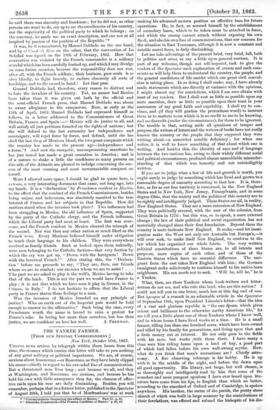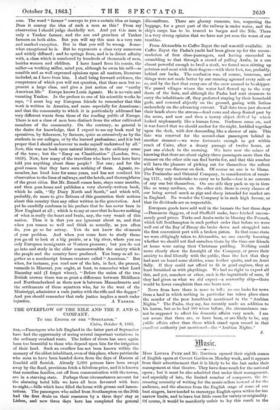THE YANKEE FARMER.
[FROM OUR SPECIAL CORRESPONDENT.]
New York, October 10th, 1863. UNLESS news arrives by telegraph within three hours from this time, thesteamer which carries this letter will take to you nothing of any great military or political importance. We are, of course, anxious about Rosencranz —or Rosecranz, as they have lately clipped his name—chiefly in regard to his extended line of communication. But a threatened man lives long ; and because we all, and they at Washington, and Rosecranz, are anxious, and because he has held his own with little annoyance thus far, the chances of effec- tive raids upon his rear are daily diminishing. Besides, you will remember, perhaps, that in a former letter, published in the Spectator of August 29th, I told you that he of Murfreesboro' was at work
• "Correspondence Respecting the Affairs of Mexteo." Part II., p. + " American Documents—The Present Condition of Mexico." p. 48, 49.
making his advanced eastern position an effective base for future operations. He, in fact, so secured himself by the establishment of secondary bases, which to be taken must be attacked in force, and which the enemy cannot attack without exposing his own flauk, and also his own line of communications, that our concern for the situation in East Tennessee, although it is now a constant and notable moral force, is daily diminishing.
Let me take advantage of the present brief, very brief, lull, both in politics and arms, to say a little upon general matters. It is part of my welcome, though not self-imposed, task to give the readers of the Spectator such explanation of events and such com- ments as will help them to understand the country, the people, and the general conditions of life amidst which our great civil convul- sion is taking place. In so doing I shall make, nay, I have already
made, statements which are directly at variance with the opinions, 1 might almost say the convictions, which I am sure obtain with most of my readers. But I shall rest as little as possible upon my mere assertion, draw as little as possible upon their trust in your assurances of my good faith and capability. I shall try to con- vince, and (if they will pardon the pretentious word) to instruct them as to matters upon which it is no credit to me to be knowing, and no discredit (under the circumstances), for them to be ignorant.
The trouble is that, setting aside all questions of temper and purpose, the writers of letters and the writers of books have not really known the country or the people that they supposed they were writing about—a somewhat notable deficiency ; for when one writes, it is well to know something of that about which one is writing. And besides this, the identity of race and of language between the two nations has, owing to their widely different social and political circumstances, produced almost unavoidable misunder- standing of that which was honestly and not unintelligibly written.
If you are to judge what a law of life and growth is worth, you ought surely to judge by something which has lived and grown to a reasonable degree of maturity according to that law. It is, there- fore, as far as our free territory is concerned, in the New England States and in New York, New Jersey, Pennsylvania, and in some degree Ohio, that the society and the politics of this country are to be rightly and intelligently judged. These States are all, in reality, New England States. They are a mere extension of New England.
They were politically severed, with the rest of the colonies, from Great Britain in 1776 ; but this was, so to speak, a mere external change ; the law of their political and social organization has not materially changed since their first foundation. Beyond them the country is mere inchoate New England. It seeks,—and let immi- gration make the West not only our Australia but Europe's,—it will ever seek, to make itself New England, to conform to the law which has organized our whole fabric. The very written political constitutions of these States are, to all intents and purposes, mere copies of each other, and of those of the Eastern States which have no essential difference. The emi- grant from the east takes New England with him ; the German immigrant seeks solicitously to conform himself to his native-born neighbours. His son needs not to seek. "Will he, null he," he is a Yankee.
What, then, are these Yankees whom book-writers and letter- writers do not see, and who rule this land, who are this nation? I could not tell you in one letter, much less at this fag end of one.
But apropos of a remark in an admirable article in the Spectator of September 19th, upon President Lincoln's letter—that the idea of a vast and glorious republic is "the one dream which gives colour and brilliance to the otherwise earthy American life," let me tell you a little about one of these Yankees whom I know well, and in whose house I have lived weeks at a time. He is a small farmer, tilling less than one hundred acres, which have been owned and tilled by his family for generations, and living upon that and a little money out at interest. He not only goes to the fields with his men, but works with them there. I have many a time seen him riding home upon a load of hay, a good part of which had fallen before his own well-swung scythe. Now, what do you think that man's recreations are? Chiefly astro- nomy. A fine observing telescope is his hobby. He is up with it in the middle of the night, and before the dawn upon all good opportunity. His library, not large, but well chosen, is so thoroughly and intelligently read by him that some of the soundest and most pungent opinions I have ever heard upon lite- rature have come from his lips, in English than which no better, according to the standard of Oxford and of Cambridge, is spoken anywhere. His brother, the rector of the parish, the pretty stone church of which was built in large measure by the contributions of their forefathers, was offered and refused the bishopric of his dio- cese. The word " farmer " conveys to you a certain idea or image. Does it convey the idea of such a man as this? From my observation I should judge decidedly not. And yet this man is only a Yankee farmer, and the son and grandson of Yankee farmers on both sides. But you will say this man is a very rare and marked exception. But in that you will be wrong. Some- what exceptional he is. But he represents a class very numerous and widely diffused; and he springs from, and is in direct affinity with, a class which is numbered by hundreds of thousands of men, besides women and children. I have heard from his cousin, the miller—a working miller, mind you, although he owns his mill—as sensible and as well expressed opinions upon all matters, literature included, as I have from him. I shall bring forward evidence, the competence of which you will not question, that these men but re- present a large class, and give a just notion of our " earthy American life." Europe knows Louis Agassiz. He is no vain and vaunting Yankee. In the preface to one of his scientific works he says, " I must beg my European friends to remember that this work is written in America, and more especially for Americans ; and that the community to which it is particularly addressed has very different wants from those of the reading public of Europe. There is not a class of men here distinct from the other cultivated members of the community. On the contrary, so general is the desire for knowledge, that I expect to see my book read by operatives, by fishermen, by farmers, quite as extensively as by the students in our colleges, or by the learned professions; and it is but proper that I should endeavour to make myself understood by all." Now, this was no book upon natural history, in the ordinary sense of the term ; but the "Essay on Classification" (London, 8vo., 1859). Now, how many of the travellers who have been here have told you anything about these people ? Not one ; and for the good reason that they have seen nothing of them. Agassiz, re- member, has lived here for some years, and has not confined his observation to the lines of railways, and the hotels, and thoroughfares of the great cities. But Mr. Russell comes here, stays some months, and then goes home and publishes a very cleverly-written book, which he calls, "My Diary North and South," and which will, probably, do more to give Britons of this generation their notions about this country than any other written in the generation. And yet he candidly confesses in his preface that he has never been in New England at all ; which is to say at once that he knows nothing of what is really the heart and brain, nay, the very womb of this nation. Thus it is that you are ignorant about us, and that when you reason so well and think so soundly, as you often do, you go so far astray. You do not know the elements of your problem. And when you come here to study them, you go off to look at a big prairie, or a big river, where you see only European immigrants or Western pioneers ; but you do not go into and study in the older commonwealths the society which the people and the country have produced. You lump us all to- gether as a nondescript human creature called "American." But when, for instance, you read now of the late, in fact, the present, turmoils in Missouri, you ought, at least, to remember what Lord Macaulay said (I forget where), " Before the union of the two British crowns there was as great a difference between Middlesex and Northumberland as there now is between Massachusetts and the settlements of those squatters who, far to the west of the Mississippi, administer a rude justice with the rifle and the dagger." And you should remember that rude justice implies a much ruder































 Previous page
Previous page